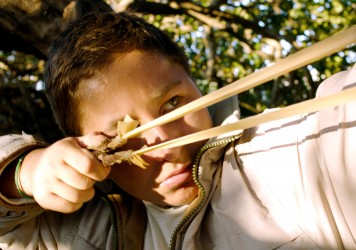A small Romani community is the setting for Jonas Carpignano’s tender coming-of-age story.
Director Jonas Carpignano broke through on the festival circuit in 2015 with Mediterranea, a tale of two refugees making their way from Africa to southern Italy. He returns to the latter environment with follow-up feature The Ciambra, an expansion of a 2014 short, which attempts to present a portrait of another marginalised group with a similar degree of verisimilitude: in this case, a small Romani community in the Italian region of Calabria.
His approach towards realism not only involves shooting on handheld 16mm in a vérité documentary style and populating his cast with mostly non-professional actors. It also includes many of his lead performer’s actual family as members of his on-screen household. Fourteen-year-old Pio (Pio Amato) is that central character, a young man in a hurry to grow up; freely smoking and drinking, presenting an outwardly cocksure exterior, yet terrified to talk to a girl he likes.
He follows his older brother, Cosimo (Damiano Amato), everywhere, picking up the tricks of the various hustling trades required to survive on the streets of their hometown. When his role model sibling is suddenly imprisoned by police, and his father also taken in, Pio takes up the mantle of head of the family. His unusual ease with sliding between the region’s various factions – fellow Romani, local Italians and African immigrants – proves useful at first, but his increasingly dangerous criminal actions attract unwelcome attention.
If these coming-of-age story points sound familiar, Carpignano is at least careful not to overplay any of his narrative beats, though a certain turn in the third act depends on a big convenience that’s a little hard to swallow. That said, the writer/director has a real gift for a sense of place and this largely works in creating a vivid portrait of this region. So much so that you almost wish it would step outside Pio’s point of view to let us get to know some of the supporting players more.
Published 15 Jun 2018
Italy’s submission for Best Foreign Language Film at the Oscars just gone.
Mostly solid, though lacking some urgency in its near two-hour runtime.
The textures and attention to detail enrich the familiar story beats.

Europe’s migrant crisis is brought into focus in this quietly thought-provoking documentary.

This surprising winner of the Venice Golden Lion is a quaint, amusing if not particularly life-altering slice of Italian psychogeography.

By Mark Allison
A group of German POWs are forced to dig up land mines in Martin Zandvliet’s war drama.